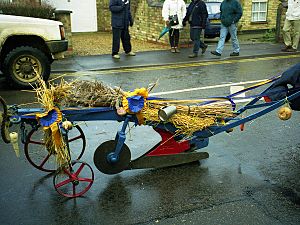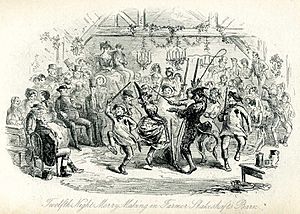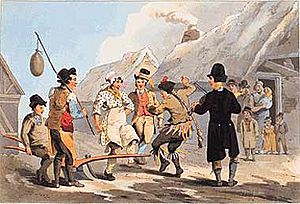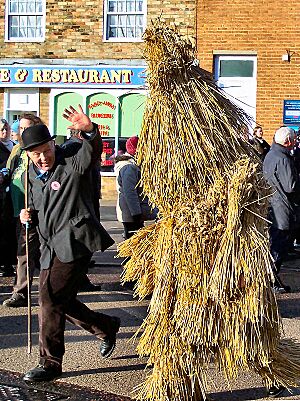Plough Monday facts for kids
Plough Monday is a special day that marks the start of the farming year in England. It's usually the first Monday after Epiphany, which is on January 6th. People have been celebrating Plough Monday since the late 1400s. The day before Plough Monday is sometimes called Plough Sunday.
Contents
History of Plough Monday


In the past, especially in northern and eastern England, Plough Monday was when people went back to work after the Christmas holidays. The way people celebrated was a bit different in each area. But a common tradition was to pull a plough from house to house. They would collect money from people.
Often, musicians would join the procession. There was also usually an old woman, or a boy dressed as one, called the "Bessy." A man dressed as a "fool" would also be part of the group. A special food called 'Plough Pudding' was eaten on this day in Norfolk. It's a boiled pudding with meat and onions.
An old book from 1777 describes a "Fool Plough" custom in northern England. This involved "sword dancers dragging a plough" with music. One or two people wore very strange clothes. The Bessy dressed like an old woman, and the Fool was covered in animal skins with a hairy cap. The Fool's job was to shake a box and collect small gifts of money from the people watching the dance.
On the Isles of Scilly, people would visit their neighbors. They would tell jokes about local events and do "guise dancing." There was also a lot of celebrating and drinking.
Modern Celebrations
Plough Monday traditions became less popular in the 1800s. But some towns brought them back in the 1900s. Today, these customs are often linked with Molly dancing. A good example of this can be seen every year in Maldon in Essex.
Whittlesey Straw Bear Festival
In the 1800s, instead of pulling a decorated plough, men or boys would dress up in straw. They were called Straw Bears and would go from door to door asking for money. This tradition continues every January in Whittlesey, near Peterborough. On the Saturday before Plough Monday, the "Straw Bear is paraded through the streets of Whittlesey."
Goathland Plough Stots
In Goathland, North Yorkshire, a group performs a Long Sword dance every Plough Monday.
In Other Countries
In some parts of Belgium, the Monday after Epiphany is called Verloren Maandag. This means lost Monday, because it was a day without work or pay. Special foods are eaten on this day.
See also
- Royal Ploughing Ceremony in Southeast Asia
- Plugușorul
 | Madam C. J. Walker |
 | Janet Emerson Bashen |
 | Annie Turnbo Malone |
 | Maggie L. Walker |



